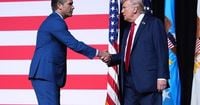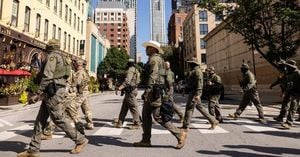On October 1, 2025, the usually disciplined and tradition-steeped halls of the U.S. military were rocked by a dramatic and highly controversial event at Marine Corps Base Quantico, Virginia. Defense Secretary Pete Hegseth, flanked by President Donald Trump, summoned more than 800 of the nation's top military leaders for what many later described as an unprecedented and unsettling display of political theater. The gathering, marked by sweeping new directives and fiery rhetoric, has since triggered a fierce national debate about the future of the armed forces, gender equality in combat, and the politicization of military leadership.
According to The Nation, the abrupt assembly of so many high-ranking officers from posts around the globe was both costly and, in the eyes of some, strategically risky. The stated purpose quickly became clear: Hegseth was there to announce a seismic shift in military policy. With President Trump looking on, the secretary declared an end to what he called "woke" culture in the military, promising a return to what he described as the “warrior ethos.” Hegseth’s message was blunt: "You kill people and break things for a living. You are not politically correct and don’t necessarily belong always in polite society."
The centerpiece of Hegseth’s vision? A new physical fitness standard for all combat roles, mandating that every candidate—regardless of gender—must meet the "highest male standard only." As Nexstar Media reported, Hegseth told the assembled officers, "At my direction, each service will ensure that every requirement for every combat MOS [military occupational specialty], for every designated combat arms position, returns to the highest male standard only, because this job is life or death, standards must be met, and not just met—at every level, we should seek to exceed the standard, to push the envelope, to compete." He added, "If women can make it, excellent. If not, it is what it is. It will also mean that weak men won’t qualify—because we’re not playing games. This is combat. This is life or death."
The implications of this change were not lost on critics. Representative Mikie Sherrill (D-N.J.), herself a former Navy pilot and a current candidate for New Jersey governor, wasted no time in denouncing the move. In a statement to Nexstar Media, she said, "Eliminating the current highly rigorous standards for women in combat positions has nothing to do with increasing lethality and everything to do with forcing women out of the Armed Services." Sherrill went further, accusing Hegseth of escalating a "war on women in the military" and injecting partisan politics into what should be a nonpartisan institution. She described the Quantico event as a "vanity rally" and "yet another display of incompetence," declaring, "Serving in the military is a serious business for serious people. Today’s campaign rally is just the latest example of how Secretary Hegseth is incapable of doing his job and has to resort to theatrics to distract from his failures."
Colorado Democratic Representative Jason Crow, a former Army Ranger, echoed Sherrill’s concerns. In an interview the following day, Crow described the gathering as a "grotesque and appalling display of culture war rhetoric to a group of some of our finest military commanders and civil servants." Addressing the new standards, Crow pointed out, "There are women in Ranger units, there are women that have gone to Ranger school. They have met the same standard as every other recruit and candidate in that school. So [Sec. Hegseth] is largely making things up here." Crow accused Hegseth of attempting to "drum women out of important combat specialties and the leadership role within our military, which would make our country less safe and make our military less effective."
But the changes didn’t stop at physical fitness. Hegseth also imposed new grooming rules—"No more beards, long hair, superficial individual expression. We’re going to cut our hair, shave our beards, and adhere to standards," he announced, as reported by The Nation. Critics quickly noted that such policies could disproportionately affect Black service members, who are more likely to suffer from skin conditions aggravated by shaving. Hegseth further decreed that every member of the joint force, at every rank, would be required to pass a physical training test and meet height and weight requirements twice each year, regardless of their age or position.
The secretary’s speech was peppered with disdain for what he labeled "weak" and "woke" rules of engagement. He even lifted the ban on hazing young recruits and appeared to encourage harsher treatment of enemy combatants—a move that alarmed many veterans and military ethicists. The event’s tone was unapologetically combative, with Hegseth railing against "fat troops" and "fat generals," declaring, "It’s a bad look. It is bad, and it’s not who we are."
President Trump’s own remarks only added fuel to the fire. Speaking for more than an hour, the president boasted about U.S. nuclear capabilities and suggested that America’s "dangerous cities"—citing places like San Francisco, Chicago, New York, and Los Angeles—should be used as "training grounds for our military." He warned the officers present that their mission would increasingly focus on "the enemy within," a phrase that many interpreted as a call to prepare for domestic deployments in response to urban unrest or civil disorder. "Democrats run most of the cities that are in bad shape," Trump said. "What they’ve done to San Francisco, Chicago, New York, Los Angeles—they’re very unsafe places. And we’re going to straighten them out one by one. And this is going to be a major part for some of the people in this room. That’s a war, too. It’s a war from within."
The audience’s reaction was telling. Despite the bombast from both Hegseth and Trump, the assembled officers remained largely silent—no applause, no laughter, just a palpable sense of discomfort. As The Nation observed, "At any rate, he got no applause and no laughter from the crowd." One former defense official told Politico that the meeting was "a waste of time for a lot of people who emphatically had better things they could and should be doing. It’s also an inexcusable strategic risk to concentrate so many leaders in the operational chain of command in the same publicly known time and place, to convey an inane message of little merit."
Veterans’ groups and advocates for military families quickly condemned the event. The head of Veterans for Responsible Leadership blasted Hegseth’s assertion that the military’s purpose is to "kill people and break things," insisting that the true "warrior ethos" also includes compassion and empathy. "The military not only taught its soldiers to be lethal, but it also taught us to be compassionate and empathetic and care about not only the American people but also freedom-loving and -seeking people from all over the globe," the group’s statement read.
Adding to the turmoil, news broke the following morning that the federal government had shut down after lawmakers failed to reach a budget agreement. As The Nation reported, Trump and Republican congressional leaders refused to reverse drastic cuts to healthcare in exchange for Democratic votes, leading to the shutdown. The only government agencies left unscathed were those related to immigration enforcement, while services like Social Security faced immediate disruption.
For many, the events at Quantico symbolized a deeper crisis: a military caught in the crossfire of political battles and culture wars, with the lives and careers of service members—especially women—hanging in the balance. As the debate rages on, the silence of the officers at Quantico may speak louder than any speech: a warning that the true cost of politicizing the military could be far greater than anyone in that room imagined.




